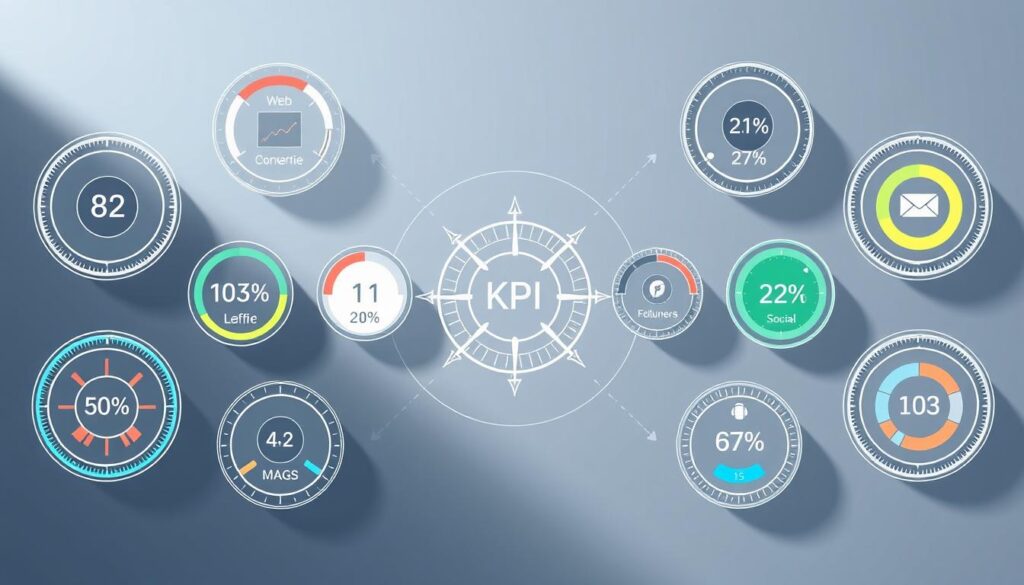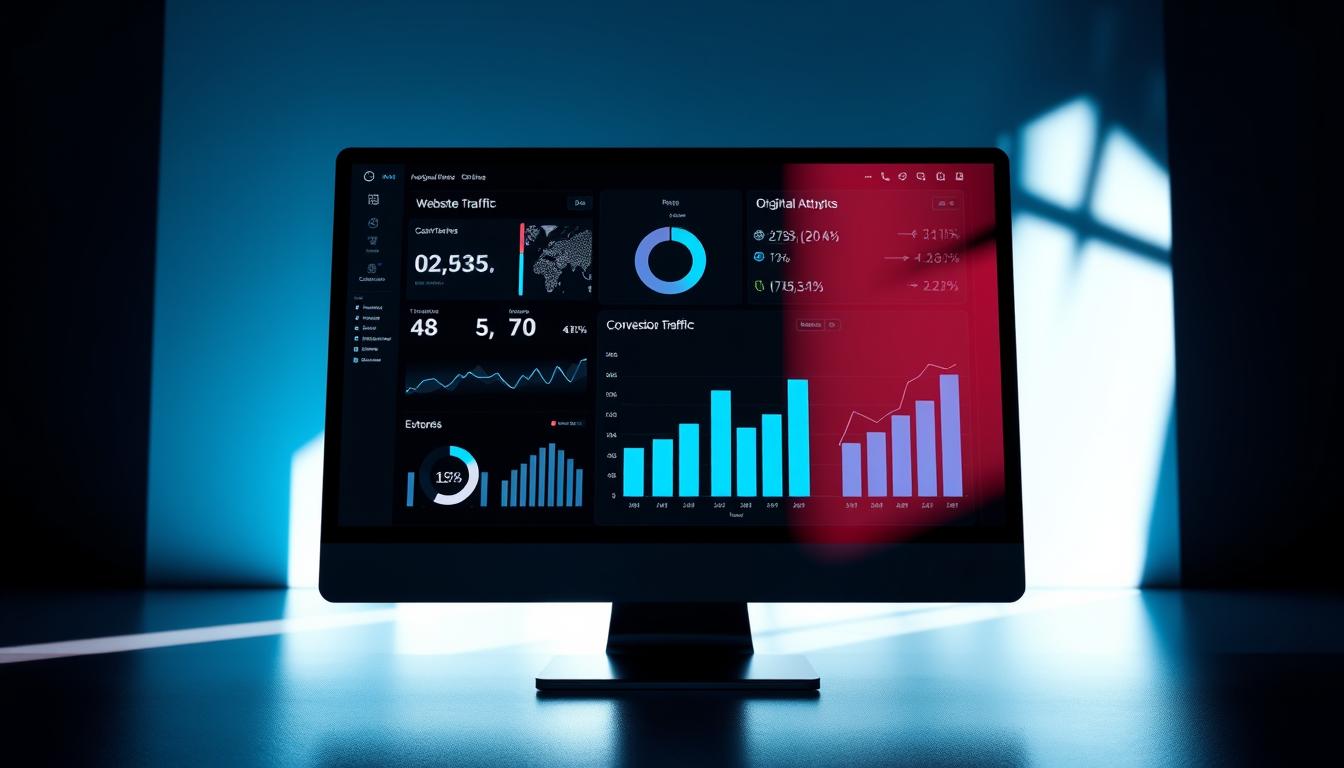Digital marketing metrics have grown more complex in today’s data world. To map Digital Marketing KPIs, you need strategic insight and precision. This helps connect online marketing metrics to real business results.
Tracking and understanding digital performance is a big challenge for businesses. Only 23 percent of marketers are sure they’re tracking the right Key Performance Indicators (KPIs). This doubt comes from changing privacy laws, complex attribution models, and fast-changing tech platforms.
It’s key to understand Online Marketing Metrics for companies wanting to improve their digital strategies. With over 2.6 billion online buyers worldwide, making data-driven decisions is more important than ever.
Key Takeaways
- Digital marketing KPIs provide essential insights into campaign performance
- Accurate tracking requires advanced attribution models
- Alignment between marketing metrics and business goals is paramount
- Technological changes continuously impact KPI measurement
- Data interpretation requires sophisticated analytical approaches
Understanding the Importance of Digital Marketing KPI Mapping
Digital marketing success depends on tracking performance well. Web Analytics KPI Mapping gives businesses key insights. It turns data into useful information.
Today’s digital campaigns need advanced tracking. Digital Campaign Performance Tracking helps see how marketing efforts lead to real business results.
Aligning Marketing Goals with Business Objectives
Good marketing starts with clear goals. It’s about matching marketing plans with business aims. Key points include:
- Setting specific, measurable marketing goals
- Linking marketing to making money
- Setting clear performance standards
The Value of Data-Driven Decision Making
Data is key for smart marketing. With detailed analytics, businesses can:
- Make the most of their marketing budget
- Find out which marketing works best
- Adjust to market changes fast
Demonstrating Marketing ROI to Stakeholders
Quantifiable results matter. With strong KPI mapping, marketers can show their value. For example, existing customers often spend 67% more than new ones. This shows why tracking performance is crucial.
By using Digital Campaign Performance Tracking, businesses turn marketing into a money-maker.
Essential Digital Marketing KPIs Across Channels

Digital marketing success depends on tracking key performance indicators across different channels. A strong Digital Marketing KPI Framework helps marketers turn data into useful insights. This drives smart decisions.
Key performance indicators cover various digital channels, each giving unique insights into marketing success:
- Website Performance Metrics
- New user growth rate
- Conversion rates
- Average session duration
- Search Engine Metrics
- Organic traffic levels
- Keyword ranking positions
- Click-through rates
- Social Media Indicators
- Engagement rates
- Follower growth
- Content reach
Data-Driven Marketing Strategies need tracking these metrics fully. Knowing each channel’s KPIs helps marketers improve performance. It also helps them use resources wisely and show marketing’s value to others.
With 63,000 search queries every second and 39% of purchases influenced by searches, picking the right KPIs is key. It’s essential for staying ahead in digital marketing.
Mapping Digital Marketing KPIs to Business Outcomes
Digital marketing success comes from turning data into useful insights. It’s about linking marketing efforts to real business results. This needs smart tracking and analysis.
Businesses need strong plans for Online Conversion Optimization. They must show how marketing actions lead to clear results. The goal is to set up detailed tracking systems that show the real effect of digital marketing.
Creating Clear Attribution Models
Measuring Digital Marketing ROI well means having accurate attribution models. These models show which marketing channels are most important for making money.
- Implement multi-touch attribution tracking
- Identify critical customer interaction points
- Assign weighted values to different marketing touchpoints
Connecting Marketing Metrics to Revenue
To link marketing performance to money, companies need advanced analysis. They can use special tools to see how marketing actions affect sales.
- Integrate marketing and sales data platforms
- Use real-time analytics for immediate insights
- Develop comprehensive reporting dashboards
Implementing Cross-Channel Tracking Systems
Today’s digital marketing needs tracking across many platforms. Comprehensive cross-channel tracking helps businesses see the whole customer journey.
Using tools like BigQuery and Looker Data Studio, companies can set up detailed tracking. This gives deep insights into how marketing works and what customers do.
Overcoming Common KPI Tracking Challenges
![]()
Digital marketing pros often face big hurdles when tracking E-commerce Marketing KPIs. It’s key to tackle these issues to measure performance right and make smart decisions.
Some major challenges in tracking Website Performance Indicators include:
- Data Silos: Information scattered across platforms makes it hard to get a full picture
- Attribution Complexity: Figuring out which marketing efforts really work
- Measuring long-term brand performance metrics
To beat these challenges, using marketing tech stacks and advanced attribution models is key. Agencies can use top-notch tracking tools. These tools gather data from various platforms, giving a complete view of marketing success.
Here are some ways to tackle KPI tracking challenges:
- Build a single system for collecting data
- Use multi-touch attribution models
- Create dashboards that show performance in detail
- Set up consistent reporting methods
Getting real-time insights and using automated reports helps marketers spot and fix performance issues fast. By focusing on quality data and thorough analysis, businesses can turn tracking challenges into chances for growth.
Building an Effective Digital Marketing KPI Framework
Creating a strong framework for digital marketing KPIs needs careful planning and execution. Online marketing metrics are key for making data-driven decisions. They help businesses track their performance and improve continuously.
For a successful digital marketing strategy, picking the right tools and clear measurement processes are crucial. Here are the main parts to build a complete KPI framework:
Selecting Powerful Analytics Tools
When picking analytics platforms, look at these important factors:
- Integration with current marketing systems
- Real-time reporting
- Customizable dashboards
- Advanced data visualization
Setting Realistic Performance Benchmarks
Setting meaningful benchmarks means knowing industry standards and your goals. Consider these statistical insights:
- Shoot for a 5% sales increase for certain products
- Target 5% conversion rates for key segments
- Track overall conversions year-over-year
Implementing Regular Reporting Cycles
Regular monitoring turns online marketing metrics into useful insights. Create reporting cycles that:
- Give weekly or monthly snapshots
- Compare current metrics to past data
- Show trends and areas for improvement
By using these strategies, businesses can build a dynamic digital marketing KPI framework. This framework drives strategic insights and supports ongoing business growth.
Conclusion
Digital marketing is complex, but with a strategic plan, it can be mastered. Marketing teams need to turn data into insights that grow the business. A strong KPI framework unlocks the best of digital marketing.
Improving digital marketing is an ongoing effort. Successful teams keep refining their KPI tracking. They focus on 3-5 key metrics to avoid data overload and see how well they’re doing.
Crowley Media Group can help elevate your digital marketing. They specialize in SEO, PPC, AI, and automation. Their team can turn your tracking into a strong advantage. Call them at (916) 572-9755 or visit crowleymediagroup.com to start your journey.
The real aim of tracking digital marketing KPIs is to improve ROI and meet business goals. It’s not just about measuring, but about making marketing better over time.
FAQ
What are digital marketing KPIs and why are they important?
How do I choose the right KPIs for my digital marketing strategy?
What are the most important digital marketing KPIs to track?
How can I overcome challenges in tracking digital marketing KPIs?
What tools can help me track and map digital marketing KPIs?
How often should I review my digital marketing KPIs?
How do I demonstrate marketing ROI to stakeholders?
What’s the best way to connect marketing metrics to revenue?
How can I improve my digital marketing KPI tracking?
Source Links
- https://www.searchenginejournal.com/mapping-digital-marketing-kpis-business-outcomes/539962/
- https://online.hbs.edu/blog/post/marketing-kpis
- https://usermaven.com/blog/digital-marketing-metrics-and-kpis
- https://influencermarketinghub.com/digital-marketing-metrics-kpis/
- https://www.mayple.com/resources/digital-marketing/tools-for-marketing-kpis-success
- https://www.wrike.com/blog/digital-marketing-kpis-guide/
- https://www.qlik.com/us/kpi/kpi-marketing
- https://www.fratzkemedia.com/insights/digital-marketing-audit-benchmarking
- https://www.wearediagram.com/blog/mapping-business-goals-to-trackable-kpis
- https://www.grow.com/blog/the-right-kpis-for-each-of-your-digital-marketing-strategies
- https://www.linkedin.com/pulse/mapping-digital-marketing-kpis-business-outcomes-guide-mohammad-eid-oe0de
- https://agencyanalytics.com/blog/kpi-tracking
- https://marketingforit.com/kpis/digital-marketing-kpis
- https://www.omniconvert.com/blog/maslow-pyramid-for-online-marketing-kpis/
- https://www.spiderstrategies.com/kpi/department/marketing/
- https://growsurf.com/blog/digital-marketing-kpis








